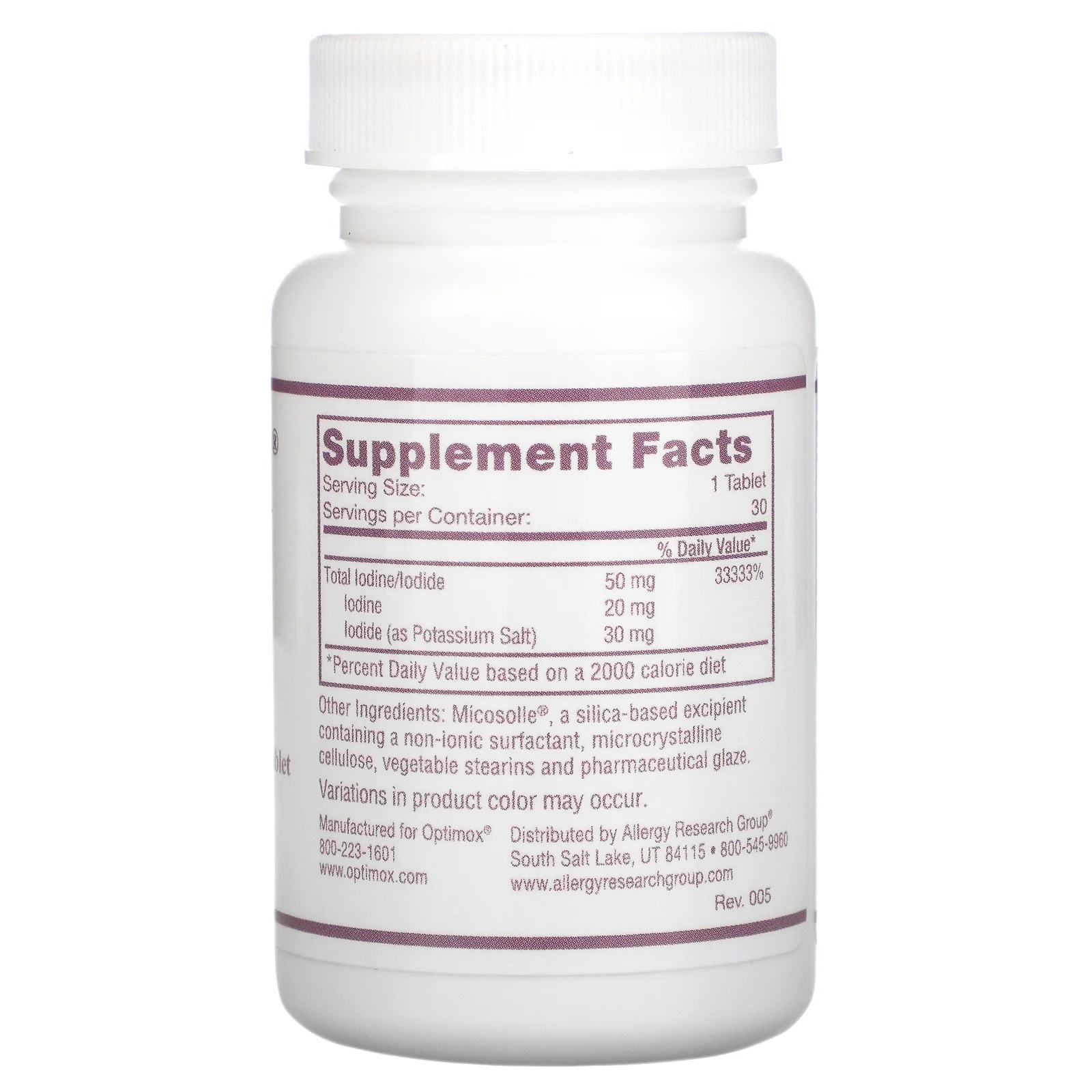Understanding Iodoral and its Potential Benefits
Iodoral, a supplement containing iodine and potassium iodide, has garnered interest for its potential health benefits. Available in tablet and liquid forms, it offers a convenient way to supplement iodine intake. But is it right for you? Let’s delve into Iodoral’s potential advantages, possible side effects, recommended dosages, and how it compares to other iodine sources.
Why Consider Iodoral?
Iodine is a crucial mineral, essential for thyroid function. The thyroid gland produces hormones regulating metabolism, growth, and development. Iodoral may be beneficial in several ways:
-
Addressing Iodine Deficiency: Many individuals worldwide have iodine deficiencies, which can lead to hypothyroidism (an underactive thyroid), causing fatigue, weight gain, and other symptoms. Iodoral may help correct these deficiencies and alleviate symptoms, though individual results can vary.
-
Potential Anti-inflammatory Effects: Some research suggests iodine may have anti-inflammatory properties, possibly contributing to overall health. However, more research is needed to confirm this potential benefit.
-
Protection Against Radiation: Iodoral may offer some protection against radioactive iodine exposure by saturating the thyroid with stable iodine, preventing the absorption of harmful radioactive iodine. However, this is not a foolproof method and shouldn’t replace other protective measures during a radiation emergency. Always consult medical professionals in such situations.
Potential Side Effects and Important Considerations
While Iodoral may offer benefits, it’s important to be aware of potential side effects:
-
Consult Your Doctor: Before starting any new supplement, especially if you have existing thyroid conditions, consult a healthcare provider. They can assess your needs and determine if Iodoral is appropriate.
-
Monitor for Reactions: Some individuals experience side effects such as acne, a metallic taste, or digestive upset. If you experience any unusual symptoms after starting Iodoral, contact your doctor immediately.
-
Dosage and Timing: Appropriate Iodoral dosage and timing vary depending on individual needs and health conditions. A healthcare professional can guide you on the optimal approach.
Iodoral vs. Other Iodine Supplements
How does Iodoral compare to other iodine sources?
-
Iodoral vs. Lugol’s Solution: Iodoral is essentially the tablet form of Lugol’s solution, a liquid iodine supplement. Many find tablets more convenient.
-
Iodoral vs. Nascent Iodine: Nascent iodine is sometimes marketed as superior, but further research is needed to substantiate these claims. Its efficacy and safety compared to Iodoral require more investigation.
-
Iodoral vs. Synthroid (Levothyroxine): These two are distinct. Iodoral provides iodine, while Synthroid replaces thyroid hormones. They serve different purposes and aren’t interchangeable.
Where to Purchase Iodoral
Iodoral is typically available online through various supplement retailers, health food stores, and select pharmacies.
Future Research and User Experiences
While much is known about Iodoral, research continues. Studies exploring optimal dosages for various health needs and compiling user experiences are essential. Expert opinions from thyroid specialists further inform discussions surrounding Iodoral. A balanced approach, informed by research and professional guidance, is crucial for any health supplement.
Iodoral vs. Iodine: Key Differences
Iodoral and iodine are related but not the same. Iodine is an essential element, particularly for thyroid health. Iodoral is a product containing iodine, specifically as potassium iodide, a form readily absorbed by the body.
Why Potassium Iodide?
Potassium iodide is a water-soluble form of iodine, allowing for easier absorption in the digestive system. Lugol’s solution also uses this combination, but in liquid form, which can be less convenient. Iodoral tablets offer the same benefits in 12.5mg and 50mg doses. Taking Iodoral with 500mg of Vitamin C is often recommended to enhance iodine absorption.
Precautions and Considerations
Consult a healthcare professional before starting any new supplement, especially if you have thyroid conditions or allergies. While some people experience sensitivity to iodine-based contrast dyes used in medical imaging, this doesn’t indicate they’ll react to Iodoral, as the chemical compositions differ. Ongoing research continues to explore iodine’s effects on the body.
Here’s a table summarizing the key differences:
| Feature | Iodine | Iodoral |
|---|---|---|
| Form | Basic element | Supplement (tablet form) |
| Composition | Pure iodine | Iodine as Potassium Iodide |
| Absorption | Varies | Readily absorbed |
| Dosage | Varies | 12.5mg and 50mg tablets available |
| Considerations | Many forms exist | Consult a doctor before use |
This information highlights that while iodine is essential, Iodoral offers a readily absorbable form. Consult a healthcare provider to determine if Iodoral is suitable for you.
What Does Iodine Do in Your Body?
Iodine is a vital nutrient crucial for various bodily functions. It plays a key role in:
-
Thyroid Function: Iodine is essential for producing thyroid hormones (T3 and T4), which regulate metabolism. Iodine deficiency can lead to hypothyroidism, causing fatigue, weight gain, and cognitive impairment.
-
Brain and Nervous System Development: Iodine is critical for brain development, especially during pregnancy and early childhood. Adequate intake during these periods is essential for proper cognitive function and neurological development.
-
Immune System Support: Some research suggests iodine supports immune function by regulating immune cell production and potentially enhancing their activity.
-
Antioxidant Properties: Iodine may have antioxidant properties, helping protect cells from free radical damage. However, more research is needed to fully understand this potential benefit.
Excessive iodine intake can be harmful, disrupting thyroid function. Consulting a healthcare professional before starting iodine supplements is essential.
Here’s a summary of iodine’s effects:
| Body System/Function | Iodine’s Role | Potential Consequences of Deficiency |
|---|---|---|
| Thyroid | Essential for thyroid hormone (T3 and T4) production | Hypothyroidism, goiter |
| Metabolism | Regulates metabolic rate | Weight gain, fatigue, cold intolerance |
| Brain & Nervous System | Essential for development and function | Cognitive impairment, developmental delays |
| Immune System | Supports immune cell production and function | Weakened immunity |
| Antioxidant Activity | Protects cells from free radical damage | Increased risk of cell damage |
While current research suggests these benefits, scientific understanding is continually evolving. Some experts believe iodine may influence other health areas, currently under investigation. Maintaining a healthy iodine balance is key—ensure sufficient intake through diet or supplements (if recommended by a healthcare professional), but avoid excess.
When to Take Iodoral: Optimizing Your Routine
Let’s discuss how to best incorporate Iodoral into your daily routine. Iodoral timing is flexible—you can take it morning or night. However, if you experience stomach upset, take it with food.
Dosage Guidelines
Starting with a lower dose (e.g., 12.5mg) and gradually increasing under medical supervision is usually recommended. Individual iodine needs vary; consult a healthcare professional for personalized dosage guidance. While daily intake is generally considered safe, research on optimal absorption is ongoing. Some believe occasional breaks may improve absorption, but this hasn’t been scientifically confirmed.
Consulting a Healthcare Professional
Before starting any new supplement, including Iodoral, consult your doctor, especially if you have pre-existing health conditions or take other medications. They can assess your health, consider potential interactions, and advise on the best dosage and timing. Regular monitoring of iodine levels is also recommended.
Where to Buy and Cost
Iodoral is available online (Amazon, Walmart, and the official Optimox website) and in some health food stores and pharmacies. Pricing varies depending on strength and retailer. Check the official Optimox website for current prices. Jaw pain after a filling is a common complaint, but manageable. If you’re experiencing jaw pain after filling, several strategies can provide relief. Remember, knowledge and professional guidance are essential for making informed decisions about your health.










